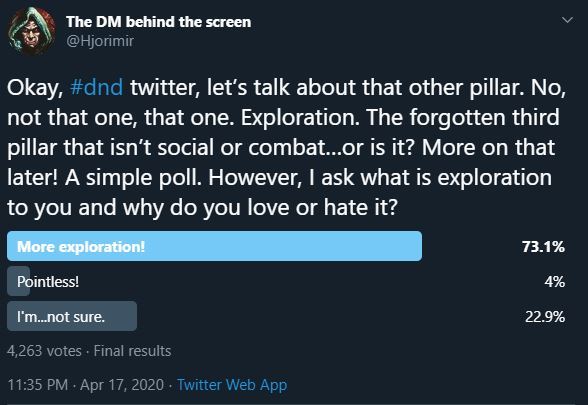Shortly after we posted our episode about exploration in Playing All The Three Pillars (listen to it here), I watch a Twitter discussion swirl around the topic of exploration. The initial question had been posed in the form of a poll by “The DM Behind the Screen” @Hjorimir:
Clearly there is a desire for exploration. But it’s a term that means a lot of different things to different people. Some see it as finding out information about a world — or your villain’s plot. Others like the gritty realism of making survival checks to cross the wilderness to some undiscovered country. For a few brave DMs, it’s about creating further mysteries to be solved, and opening opportunities for new character arcs to evolve. But for some DMs, that’s just too much extra work, and they would prefer toskip ahead with a hand wave that fast forwards the adventure to the next important part of their story.
For some DMs, exploration is calculated travel time, with each hex crossed on the map heightening conflict by draining PCs of resources and hit points. And while I like the principle behind that, I caution against achieving this outcome through the use of “random encounters.”
Don’t be that lazy as a DM. You owe it to your campaign to do better than roll on an encounter table to see what the party bumps into, or to simply wave your hand to skip all that stuff. Time at the table is precious. So it’s up to you to make sure every scene, every NPC, every detail moves the story forward, towards the party’s ultimate goal — or toward your villain’s. That’s how you keep exploration from every being boring or a waste of time.
Use every exploration scene, be it on the road or on location, to paint a more clear picture for the players as to world they live in and invest them in the stakes of the game. Allow each exploration encounter to hint (not too subtly) at the unseen forces at work in your world — or perhaps the monster we all carry inside us. Use these not-so-random exploration encounters to touch on the PC’s faults, using the time as a way for the players to become not just lost physically, but morally. Exploring each other’s character arcs is an crucial part to any campaign.
Or if your party is less into that, use not-so-random encounters to introduce the very specific creatures of the realm that foreshadow larger more dangerous fights to come — but don’t always make it about the fight. Let it be about insight and investigation, about perception and nature. Let the party try to figure out what’s going on, and give them a chance to discover clues sooner. Sometimes the greatest treasure is foreknowledge.
(Credit: header artwork by Marie Magny)

